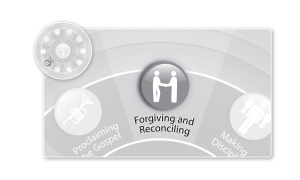 Paul says in Romans that there is therefore now no condemnation for those who are in Christ Jesus. But we should never misunderstand this and say that there is no judgment.
Paul says in Romans that there is therefore now no condemnation for those who are in Christ Jesus. But we should never misunderstand this and say that there is no judgment.
To the contrary: If we want to be forgiven and healed—if we and those we hurt are to be set free from our sin—then the evil in us needs to be named and judged by God, not hidden or downplayed or forgotten.
The doorway to hope in Christ is willingly naming with God and before others the evil in ourselves. And we do this honestly and humbly, not reluctantly or with exaggeration. And we know that he is judging—that is, setting right—the mess in us by the finished work of his son, Christ Jesus and by the present power of the Holy Spirit.
This is why from the beginning of the salvation process to its culmination (when we become fully mature in Christ), we stand before God—and before our fellow human beings—with our arms at our sides. We make no effort to justify ourselves or explain ourselves or defend ourselves or even humiliate ourselves. We don’t fear God’s judgment. We seek it and welcome it! And we don’t fear people’s disdain. Instead, we trust Christ and the Scriptures that when we willingly receive God’s judgment in Jesus’ name, we enter the narrow path to the wideness of God’s mercy.
This is very different than how most of contemporary Christianity typically regards God’s judgment. It’s often seen as a jagged metal turnstile which we pass through one single terrifying time on the way into Salvation Acres. Then after we pass through, God regards us as justified—or, as some folks like to say, “just-as-if-I’d-never-sinned.”
And that’s a glorious truth so far as it goes. Like Peter says in Acts 10:43, “All the prophets testify about him that everyone who believes in him receives forgiveness of sins through his name.”
But here’s where error creeps in: This idea of “just-as-if-I-had-never-sinned” becomes for many Christians not only an assurance of forgiveness (which it’s intended to be) but also justification for an end to ongoing repentance (which is the opposite of what God intends).
If you think about it like a courtroom, many Christians get so excited that God overturns their guilty verdict that they move for a dismissal of the evidence. We’d rather our fellow human beings not know how bad we’ve been. So God’s forgiveness becomes a gateway into a field of spiritualized denial as Larry Barber, a Christian marriage and family therapist, puts it.
Dietrich Bonhoeffer calls this cheap grace—the idea that “my only duty as a Christian is to leave the world for an hour or so on a Sunday morning and go to church to be assured that my sins are all forgiven.” Bonhoeffer was the pastor who stood against the Nazis during World War II when most German Christians didn’t. And he said that cheap grace was a major reason why most German Christians joined in lockstep with the Nazis.
And we Christians today are not that different from the German Christians under Hitler. Methodist Bishop Gregory Jones says that we Christians today often forget that Christ justifies the sinner, not the sin. Or, put a little differently, we forget that Christ saves us from our sins, not in our sins. Jones says:
A Christian account of forgiveness ought not to simply or even primarily be focused on the absolution of guilt; rather, it ought to be focused on the reconciliation of brokenness, the restoration of communion—with God, with one another, and with the whole Creation. Indeed, because of the pervasiveness of sin and evil, Christian forgiveness must be at once an expression of commitment to… “unlearn” sin and learn the ways of God (from Embodying Forgiveness: A Theological Analysis).
So when Scripture says that God remembers our sins no more (like in Isaiah 43:25, Jeremiah 31:34, Hebrews 8:12, and Hebrews 10:17), this doesn’t mean that he forgets our sins. It means that he has dealt with them conclusively—in the cross of Christ, he’s solved the problem. He’s setting everything right. He overturns the guilty verdict, but don’t miss this part:
He orders the evidence of our sin preserved.
That is, he doesn’t forget. He doesn’t just overlook. And he doesn’t want you or others to forget or just overlook either. That would take away from his glory and our growth in the image of Christ.
Like Paul said in 1 Timothy 1:16, his patience in saving us glorifies him! He doesn’t use your sin against you in the future—that’s what it means to say he remembers it no more—but once he forgives you he calls you to remember where you came from and where you really are presently at. And he calls you to submit yourself to him as he goes about his business of healing every one of your broken relationships, drying every tear that you have cried or caused others to cry, and bringing every glory to his name.
Some of that work isn’t completed on this side of glory. But he’s not waiting to begin. The kingdom of God is at hand. The king is already judging—setting things right that sin and death and evil have corrupted in you and through you.
And one thing that all of this ought to do for us is to cause us not to look down our noses at those who have sinned against us but rather, empathetically, across the aisle, as we’ll talk about in Part III of our series on Forgiving and Reconciling.











Pingback: Forgiving and Reconciling, Part VI: Why Human Forgiveness Gets In The Way of God’s Forgiveness | Rev. Eric Foley